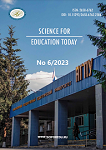Единство субъективных предикторов речевого поступка как индикатор активности субъекта в образовательной деятельности: эмпирическое исследование
The unity of subjective predictors of speech actions as an indicator of the subject’s agency in learning: An empirical study
Author(s): Tatyana Stanislavovna Vershinina, Natalia Vladimirovna ZhukovaSubject(s): Communication studies, Higher Education , Educational Psychology, Sociology of Education, Pedagogy
Published by: Новосибирский государственный педагогический университет
Keywords: Subjective predictors of speech action; Significant roles; Conjugation of the I-real/I-ideal; Type of communication; Activity indicator;
Summary/Abstract: Introduction. The article presents the results of an empirical study of subjective predictors of speech actions. The purpose of the article is to substantiate the indicators of students’ agency in learning on the basis of empirical research in subjective predictors of speech actions. Materials and Methods. The study follows A. N. Leontiev’s activity-based approach, A. A. Verbitsky’s theory of context education, and J. Kelly’s cognitive theory of personality. The research methods include the following: analysis, synthesis, generalization, classification, J. Kelly’s method of repertoire gratings, methods of mathematical statistics. Moreover, the author used cotherapeutic computer system «KELLI-98». Results. The empirical study on the unity of (connection between) subjective predictors of speech actions, which include significant roles, conjugations of the I-real/I-ideal, and the type of communication allowed to reveal four kinds of students’ agency in learning. The first one is a normal type of communication, characterized by manifested agency in interpersonal interaction with all subjects of the educational process, and speech action at the dialogue level. The second is a normal type of communication characterized by latent agency in interpersonal interaction with all subjects of the educational process; speech action at this level is an internal dialogue. The third type is a rigid type of communication distinguished by lack of objectivity in interpersonal interaction with all subjects of the educational process; speech action is characterized by opposition to others and resistance. The fourth type of communication is a rigid one. Its distinctive features include a poorly developed ability to solve problems in interpersonal interaction with all subjects of the educational process; speech actions include manipulation. Conclusions. Finally, relying on the empirical data analysis, the author concludes that the unity of subjective predictors of speech actions (significant roles, conjugation of the I-real/I-ideal, type of communication) is an indicator of ‘activity/inactivity’; on the basis of this indicator, four kinds of students’ learning behaviors are described.
Journal: Science for Education Today
- Issue Year: 13/2023
- Issue No: 6
- Page Range: 193-208
- Page Count: 16
- Language: Russian

